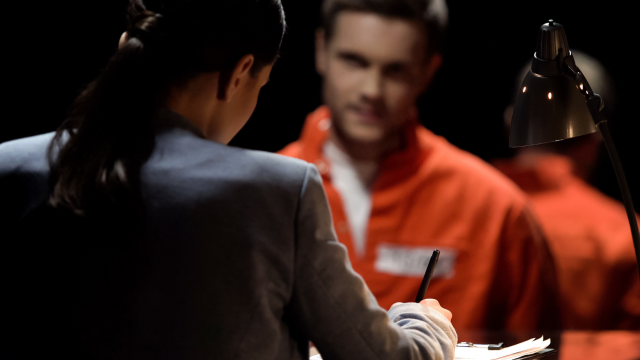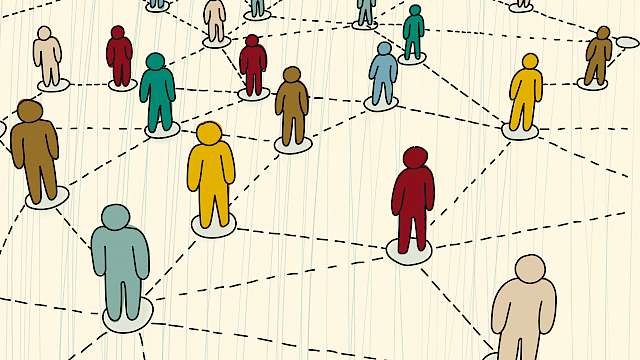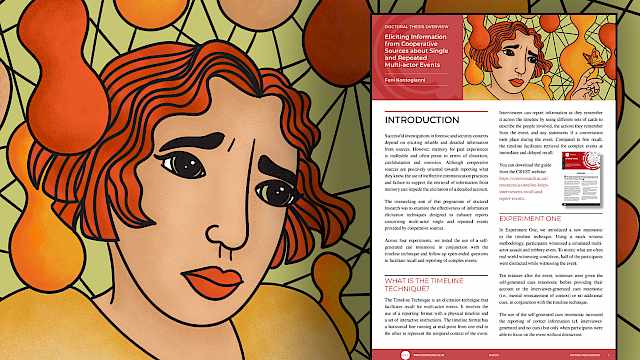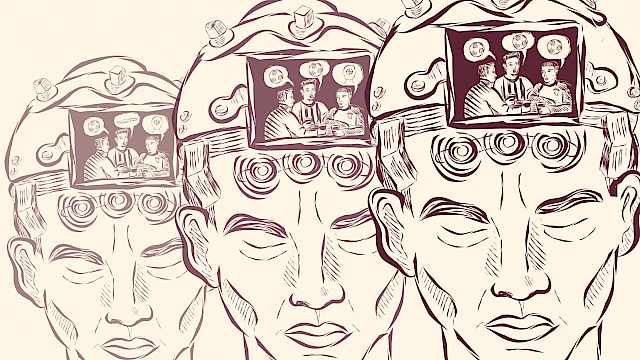Feni Kontogianni
CREST Outputs
Projects
Articles
Academic Publications
Facilitating recall and particularisation of repeated events in adults using a multi-method interviewing format
Reports about repeated experiences tend to include more schematic information than information about specific instances. However, investigators in both forensic and intelligence settings typically seek specific over general information. We tested a multi-method interviewing format (MMIF) to facilitate recall and particularisation of repeated events through the use of the self-generated cues mnemonic, the timeline technique, and follow-up questions. Over separate sessions, 150 adult participants watched four scripted films depicting a series of meetings in which a terrorist group planned attacks and planted explosive devices. For half of our sample, the third witnessed event included two deviations (one new detail and one changed detail). A week later, participants provided their account using the MMIF, the timeline technique with self-generated cues, or a free recall format followed by open-ended questions. As expected, more information was reported overall in the MMIF condition compared to the other format conditions, for two types of details, correct details, and correct gist details. The reporting of internal intrusions was comparable across format conditions. Contrary to hypotheses, the presence of deviations did not benefit recall or source monitoring. Our findings have implications for information elicitation in applied settings and for future research on adults’ retrieval of repeated events.
(From the journal abstract)
Kontogianni, F., Rubinova, E., Hope, L., Taylor, P. J., Vrij, A., & Gabbert, F. (2021). Facilitating recall and particularisation of repeated events in adults using a multi-method interviewing format. Memory, 29(4), 471–485.
https://doi.org/10.1080/09658211.2021.1903508Exploring cultural differences in eyewitness accounts using a self-administered reporting technique
In a globalised world, investigators often interact with witnesses from diverse cultural backgrounds. To date, there is a wealth of research on the use of evidence-based practices to facilitate recall and reporting in information elicitation contexts. However, research has been primarily conducted with participants from western (and typically individualistic) cultural contexts, ignoring the potential effects of cultural communication norms on memory reporting among other factors. We compared reports provided by two samples that contrast on the individualist-collectivist dimension (UK vs Lebanon). Participants (N = 118) witnessed a staged crime event and provided an account (in their native language) using a self-administered Timeline Technique or a Free Recall format, before responding to cued recall questions. As in previous research, UK participants reported more correct information when using the Timeline Technique compared to free recall. Contrary to hypotheses, participants in Lebanon provided a similar amount of information across reporting format conditions. Overall, Lebanese participants provided fewer correct details both in spontaneous self-administered reporting formats and in cued recall, compared to their UK counterparts. These findings have implications for information-gathering practices in cross-cultural interactions and highlight the (potential) need to modify existing techniques for different cultural contexts.
(From the journal abstract)
Hope, L., Kontogianni, F., et al. (2023) Exploring cultural differences in eyewitness accounts using a self-administered reporting technique, Psychology, Crime & Law, https://doi.org/10.1080/1068316X.2023.2279330
https://doi.org/10.1080/1068316X.2023.2279330
Projects
Articles
Academic Publications
Facilitating recall and particularisation of repeated events in adults using a multi-method interviewing format
Reports about repeated experiences tend to include more schematic information than information about specific instances. However, investigators in both forensic and intelligence settings typically seek specific over general information. We tested a multi-method interviewing format (MMIF) to facilitate recall and particularisation of repeated events through the use of the self-generated cues mnemonic, the timeline technique, and follow-up questions. Over separate sessions, 150 adult participants watched four scripted films depicting a series of meetings in which a terrorist group planned attacks and planted explosive devices. For half of our sample, the third witnessed event included two deviations (one new detail and one changed detail). A week later, participants provided their account using the MMIF, the timeline technique with self-generated cues, or a free recall format followed by open-ended questions. As expected, more information was reported overall in the MMIF condition compared to the other format conditions, for two types of details, correct details, and correct gist details. The reporting of internal intrusions was comparable across format conditions. Contrary to hypotheses, the presence of deviations did not benefit recall or source monitoring. Our findings have implications for information elicitation in applied settings and for future research on adults’ retrieval of repeated events.
(From the journal abstract)
Kontogianni, F., Rubinova, E., Hope, L., Taylor, P. J., Vrij, A., & Gabbert, F. (2021). Facilitating recall and particularisation of repeated events in adults using a multi-method interviewing format. Memory, 29(4), 471–485.
Exploring cultural differences in eyewitness accounts using a self-administered reporting technique
In a globalised world, investigators often interact with witnesses from diverse cultural backgrounds. To date, there is a wealth of research on the use of evidence-based practices to facilitate recall and reporting in information elicitation contexts. However, research has been primarily conducted with participants from western (and typically individualistic) cultural contexts, ignoring the potential effects of cultural communication norms on memory reporting among other factors. We compared reports provided by two samples that contrast on the individualist-collectivist dimension (UK vs Lebanon). Participants (N = 118) witnessed a staged crime event and provided an account (in their native language) using a self-administered Timeline Technique or a Free Recall format, before responding to cued recall questions. As in previous research, UK participants reported more correct information when using the Timeline Technique compared to free recall. Contrary to hypotheses, participants in Lebanon provided a similar amount of information across reporting format conditions. Overall, Lebanese participants provided fewer correct details both in spontaneous self-administered reporting formats and in cued recall, compared to their UK counterparts. These findings have implications for information-gathering practices in cross-cultural interactions and highlight the (potential) need to modify existing techniques for different cultural contexts.
(From the journal abstract)
Hope, L., Kontogianni, F., et al. (2023) Exploring cultural differences in eyewitness accounts using a self-administered reporting technique, Psychology, Crime & Law, https://doi.org/10.1080/1068316X.2023.2279330






